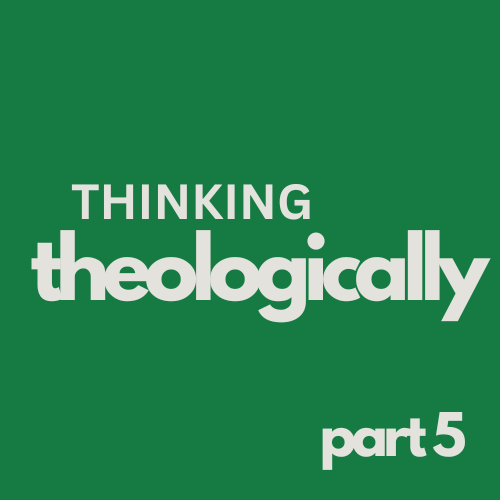The Collision of Belief and Reality: Theology in Real Life
How to Think Theologically, Part 5
My heart always grieves when people don’t see themselves as theologians. Often, most believe that studying “theology” should be left to the scholars. In this way, so many believe that theology is something you do with a stack of books and a highlighter, as opposed to highs, lows, tears, smiles, and a deep relationship with Jesus.
The common belief is that theology is abstract, theoretical, and, well, other people’s job. The truth is, you’re already doing theology. The real question, then, is—are you doing it well?
Theology doesn’t live in your notebook. It lives in the way you talk to your spouse. It lives in your inbox, in how you spend money, in how you grieve, and in how you determine your political stances.
It lives in your silence and in your singing. It lives in how you forgive, how you suffer, and how you hope.
Thus, it is essential that we connect the dots between your theology and your real life. We must learn to think theologically—not just academically, but formationally.
This is what I mean…
The Myth of “Neutral” Living
Whether you realize it or not, every decision you make flows from a belief about God.
If you fear failure more than anything, you might believe that your worth is in your performance. If you ignore Sabbath rest, you might believe God only loves you when you’re useful. If you keep people at a distance, you might believe God does the same.
These aren’t just personality traits. They’re practical theologies.
[[ For what it’s worth, bad theology isn’t always in your mouth. Sometimes, it shows up in your habits. Ouch. ]]
Theology Is Supposed to Be Lived
In Romans 12:1 (ESV), the Apostle writes, “I appeal to you… by the mercies of God, to present your bodies as a living sacrifice… which is your spiritual worship.” This is theology in motion.
Paul wasn’t inviting people to a conference or a creed (although creeds are great, for real, don’t hear me wrong). He was simply saying that we need to let everything we believe about God transform the way we live.
Real theology always walks with a limp, so to speak. It’s supposed to become part of your muscle memory. It changes how you show up. How you parent. How you endure pain. How you handle power. You see what I mean?
Theology as Muscle Memory
Here are a few areas where your theology is evident in real life—whether you intended it to be or not…
1. Suffering
What do you believe about pain? A shallow theology will say things like “everything happens for a reason” or “God just needed another angel.” In truth, mature theology allows for lament, wrestles with mystery, and clings to the cross.
God doesn’t always explain himself, but he has revealed himself, most clearly in Jesus. And that Jesus is no stranger to suffering.
The author of Hebrews, in Hebrews 4:15 (ESV), writes, “For we do not have a high priest who is unable to sympathize…” Thus, suffering isn’t the absence of God. Sometimes it’s the classroom where we learn to see him more clearly.
2. Money
How you spend money says something about who (or what) you trust. A prosperity gospel will treat God like a vending machine. A poverty gospel will glorify lack.
The gospel of Jesus calls us to generosity, stewardship, and a freedom from being mastered by money. Matthew 6:24 (ESV) says, “You cannot serve God and money.” Thinking theologically about money doesn’t mean you never enjoy it. It just means you no longer serve it.
3. Forgiveness
This is where it gets dicey. If you believe that forgiveness has to be earned, you’ll never be able to give it freely. However, if your theology is built on the scandal of grace, it will inevitably seep into your relationships.
In Ephesians 4:32 (ESV), Paul writes, “Be kind to one another, tenderhearted, forgiving one another, as God in Christ forgave you.” You don’t have to trust again right away. You don’t have to pretend it didn’t hurt. That said, forgiveness frees you from letting bitterness do your theology for you.
4. Hope
Are you hopeful? No, really—do you wake up expecting resurrection? Or are you secretly preparing for disappointment?
Your eschatology (that’s a fancy word for “what you believe about the end”) is shaping your now. 1 Peter 1:13 (ESV) says, “Set your hope fully on the grace that will be brought to you at the revelation of Jesus Christ.” This isn’t about ignoring the pain of the present—it’s about refusing to let it be the final word.
Christian hope doesn’t deny reality. It simply dares to believe in a greater one.
[[ For what it’s worth, pessimism is not a spiritual gift. Hope is. Think about that! (See Romans 15:13) ]]
What This Ultimately Means
If theology is this connected to your actual life, then maybe the question isn’t about what you believe but more so about what your life reveals that you believe.
Does my calendar reflect what I believe about rest? Does my tone reflect what I believe about grace? Does my social media reflect what I believe about love? None of us gets this perfect. But that’s not the point.
The point is to align our lived lives with our confessed beliefs. That’s what theological formation is all about.
Hopefully, That Made Sense
You don’t need a PhD to be a theologian. You need an open Bible, a hungry heart, and the humility to let truth shape your habits.
I’m not talking about just thinking “better thoughts.” I’m reminding you that theology isn’t a subject—it’s a way of life.
So keep thinking deeply, keep asking questions, and don’t forget to let your theology walk around in your shoes.
You’re already a theologian. Now go live like it.
Until next time,
Petey




Awesome!!
I love it!!